On Friday Donald Trump’s longed for man-to-man confrontation with Vladimir Putin will finally take place in Alaska.
The US President deftly paved the way for this diplomatic showdown last week when he removed a key stumbling block to such a meeting: the presence of Volodymyr Zelensky.
Asked whether Putin had to meet the Ukrainian first to be granted an audience with the US President, Trump replied: ‘No, he doesn’t.’
This is a superpowers-only invitation. Watching closely on Friday will, of course, be Chinese president Xi Jinping, who enjoys far greater influence over Putin than Trump could wish for.
The course of the Ukraine conflict will be decided, it seems, in Beijing, Washington and Moscow, as the world enters a new era of superpowers ruled by super-egos.
Three military behemoths are locked in a struggle for global influence. With their strong-man leaders, the United States, Russia and China now dominate the world.
Our map reveals this shifting balance of power and the most hotly contested regions. The blue represents the US and countries under her sway – including most of Europe.
Red is for China, which exerts an increasingly powerful grip across much of Asia, Africa and South America. And black is the Russian Federation, its dark pall falling over pockets of eastern Europe, North Africa and beyond.
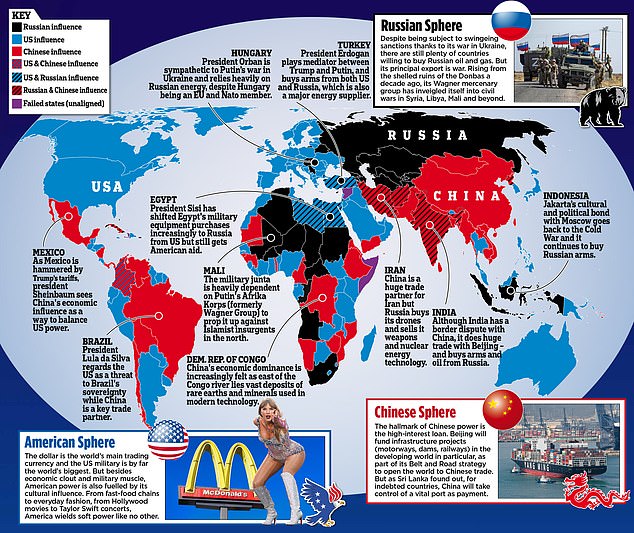
Our map reveals this shifting balance of power and the most hotly contested regions. The blue represents the US and countries under her sway – including most of Europe. Red is for China and black is the Russian Federation
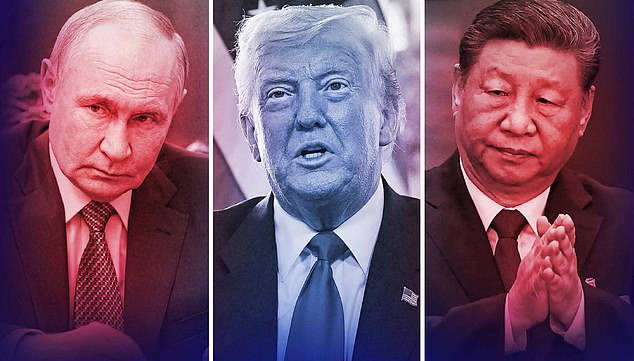
Today, there are three giants at the table. And the rest of the world is on the menu.
In this tri-polar world, each power wields a different kind of influence. Russia does so militarily, having launched an invasion of its democratic neighbour.
China’s power is more economic, granting loans on swingeing terms under its ‘Belt and Road Initiative’ to developing nations, and then seizing control when they default under the weight of debt.
America not only has financial clout and military muscle, but also soft power – through fashion, music, film and fast food. Its economy has been waning for years but Trump is attempting to rebuild it with his aggressive use of tariffs.
The situation is reminiscent of that grim joke by the Napoleonic-era cartoonist James Gilray. He famously drew the world as a plum pudding, with British prime minister Pitt the Younger and Napoleon carving it up between them.
But today, there are three giants at the table. And the rest of the world is on the menu.
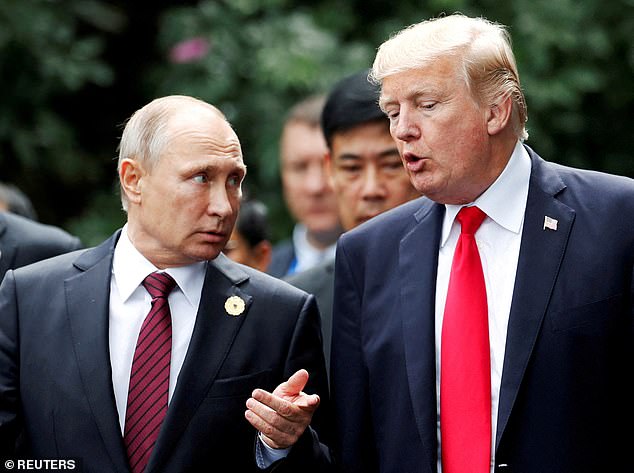
The dollar is still the global reserve currency but it is less dominant than before. Trump’s re-election has been marked by isolationism and the public avowal to avoid entanglements in foreign conflicts. Pictured: Trump and Putin at the APEC Summit in Danang, Vietnam in 2017
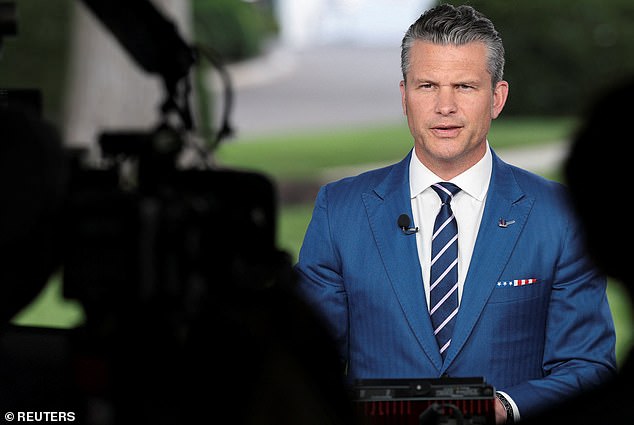
Aggressive posturing towards Greenland and Canada – together with Secretary of Defence Pete Hegseth’s (pictured) declaration in February that the US will no longer underwrite European security – has left America’s allies asking whether Nato has a future
UNITED STATES
The dollar is still the global reserve currency but it is less dominant than before. Trump’s re-election has been marked by isolationism and the public avowal to avoid entanglements in foreign conflicts (although military operations in Iran and the continued supply of arms to Ukraine have counteracted this).
Nevertheless, aggressive posturing towards Greenland and Canada – together with Secretary of Defence Pete Hegseth’s declaration in February that the US will no longer underwrite European security – has left America’s allies asking whether Nato has a future.
Despite Trump’s threats to exploit or even seize territories, his ‘America First’ instincts will cost him friends. But he knows he cannot allow the two other superpowers to team up against the US.
Last year, Trump accused his predecessor Joe Biden of ‘uniting’ Moscow and Beijing, and warned: ‘I’m going to have to un-unite them, and I think I can do that.’
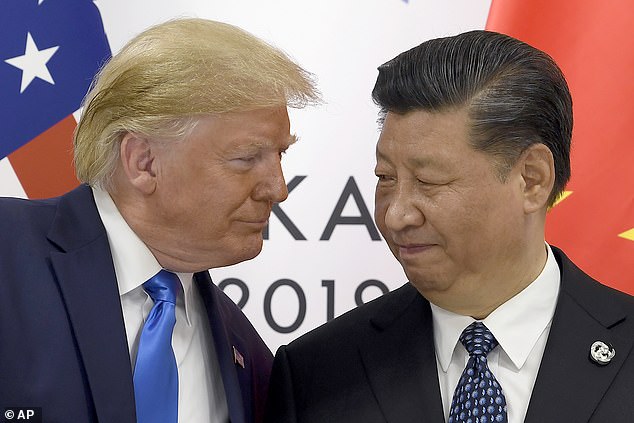
Trump’s own admission that Xi has extended a formal invitation suggests momentum is building toward a face-to-face – despite his attempt to cast himself as disinterested. The pair are pictured on the sidelines of the G-20 summit in Osaka, Japan, in June 2019
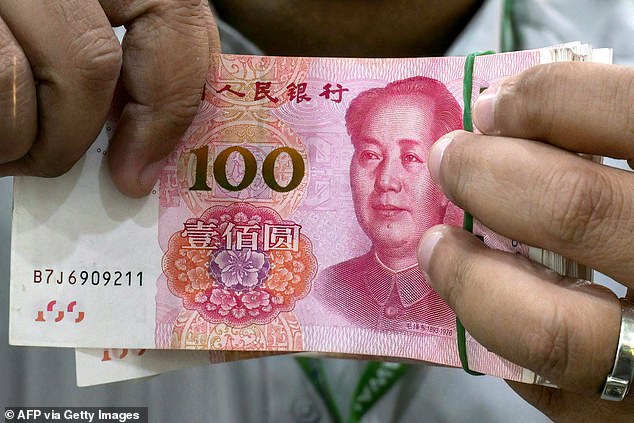
Governments of poor countries threatened with American tariffs are backing away from the dollar. The obvious alternative is the Chinese renminbi, or yuan (pictured); one yuan is currently worth about 10p
CHINA
As Mohammed Bin Salman, the Crown Prince of Saudi Arabia, puts it: ‘The world can live without America. It can’t live without China.’ Chinese products are an irreplaceable part of life and Beijing is reshaping the planet.
Governments of poor countries threatened with American tariffs are backing away from the dollar. The obvious alternative is the Chinese renminbi, or yuan; one yuan is currently worth about 10p.
China’s workforce is formidable – though a demographic timebomb awaits as the old begin to outnumber the young, caused by its ruinous ‘one child’ policy, which ended only nine years ago.
Beijing has also cornered industries of the future such as the mining of rare-earth minerals, often found in Africa and South America, which are critical for producing solar panels and microchips.
It has done this – for now, at least – with money rather than arms.
China knows how to buy influence by ‘investing’ in infrastructure that it can use to control client states.
But in time, Beijing may seek to reclaim territory it believes it rightfully owns – not least Taiwan, which has an implicit guarantee of US protection.
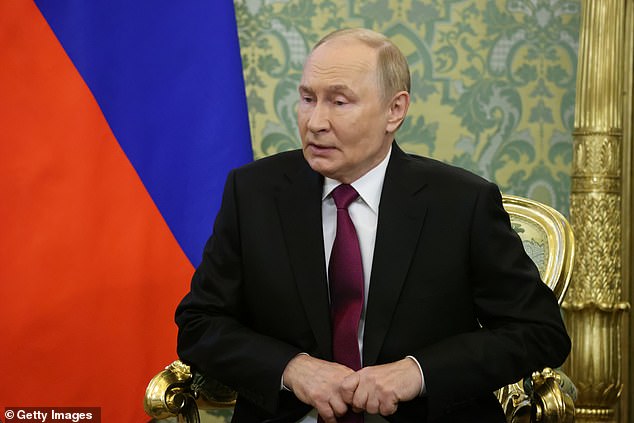
The vast and underpopulated expanses of Russia boast tremendous energy reserves. Countries from Brazil to India and China still depend on them, despite the sanctions imposed by the West. Pictured: Putin on August 7
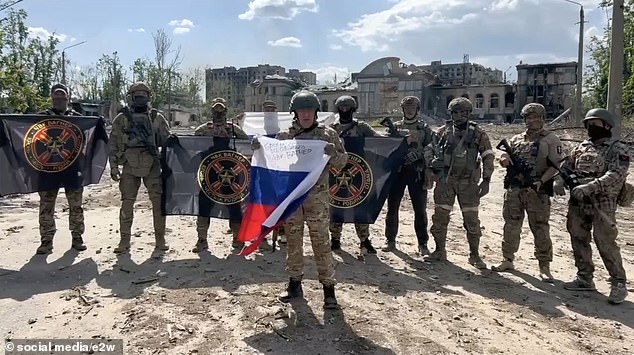
Russia’s biggest export after oil and gas is war, exemplified by its conduct in Ukraine, but also its covert war and cyber attacks against rival nations, and its use of the Wagner Group mercenaries. Pictured: Yevgeny Prigozhin, former head of the Wagner Group mercenaries in May 2023
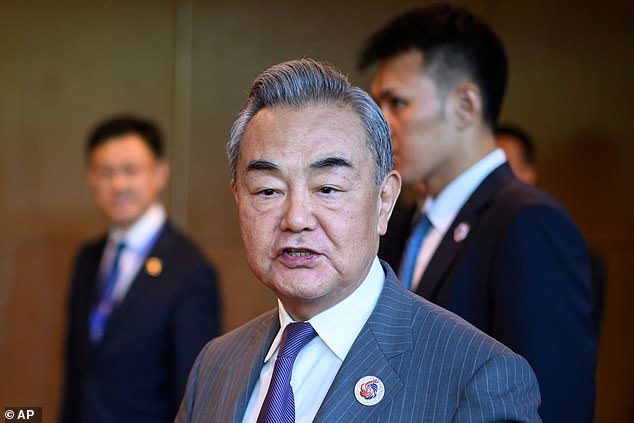
Last month, the Chinese foreign minister, Wang Yi (pictured), boasted to his opposite number in the EU, Kaja Kallas, that the invasion of Ukraine had been ‘a blessing’ for Beijing
RUSSIA
The vast and underpopulated expanses of Russia boast tremendous energy reserves. Countries from Brazil to India and China still depend on them, despite the sanctions imposed by the West.
But Russia’s biggest export after oil and gas is war, exemplified by its conduct in Ukraine, but also its covert war and cyber attacks against rival nations, and its use of the Wagner Group mercenaries.
Rising from the ruins of the conflict in the Donbas in eastern Ukraine a decade ago, the group – now renamed the ‘Afrika Korps’ – has moved on from civil wars in Syria to Libya, Mali and across the Sahel to Sudan and elsewhere.
Moscow has much more to gain from strengthening its ties with Beijing. Its military, on which it lavishes $150billion (£112billion) annually (nearly twice as much as Britain), relies on Chinese imports, ranging from fibre-optic cables used to control ‘unjammable’ drones, to nitrocellulose, vital for artillery propellant.
And China benefits equally from Russian aggression. Last month, the Chinese foreign minister, Wang Yi, boasted to his opposite number in the EU, Kaja Kallas, that the invasion of Ukraine had been ‘a blessing’ for Beijing.
- Sir Richard Shirreff is the former Deputy Supreme Allied Commander Europe of Nato.
- Mark Almond is the director of the Crisis Research Institute in Oxford.












